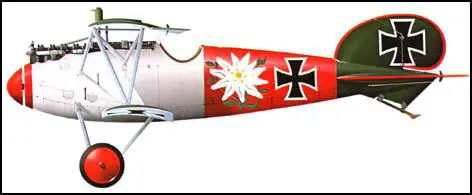Albatros D-Va
In the early part of 1917 the German Albatros D-II and its successor, the D-III, were the best performing aircraft on the Western Front and gave the Central Powers a distinct advantage over the Allies.
The arrival of the French Nieuport 17 changed this situation and the Albatros Werke Companybegan work on a new fighter. The D-V appeared on the front-line in the summer of 1917. Although similar to the Albatros D-III, it was given a slightly rounder fuselage, greater streamlining and a larger engine. By the time the Armistice was signed in 1918 there were 928 of these aircraft being used by the German Air Force.

Performance Data of the Albatros D-Va | |
|---|---|
Type | fighter |
Engine | 180 hp Mercedes |
Wing Span | 29 ft 8 in (9.05 m) |
Length | 24 ft 0 in (7.33 m) |
Height | 8 ft 10 in (2.70 m) |
Maximum Speed | 116 mph (187 kph) |
Maximum Height | 18,700 ft (5,700 m) |
Endurance | 2 hours |
Armament | 2 machine-guns |
